Deadly encounters: The night Indian army arrived in a village in IOK
Hundreds of Indian soldiers descended in Pinglan just before midnight on February 17
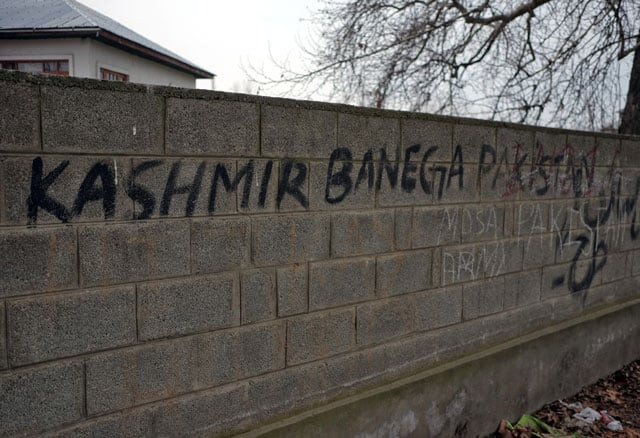
Graffiti on a wall reading "Kashmir will become Pakistan" is pictured in Pinglan village in occupied Kashmir's Pulwama district March 23, 2019. PHOTO: REUTERS
By the time they left 18 hours later, one civilian, three freedom fighters, and five members of the security forces were dead, a row of houses was reduced to rubble, an unexploded missile had been planted in a rice paddy, and more than 120 villagers had sought treatment for exposure to tear gas, alleged beatings, and in some cases mental trauma.
Reuters spent two days in Pinglan, which has a population of about 6,400, about a month after the crackdown to piece together what happened during those hours.
Interviews with more than 60 eyewitnesses indicate that soldiers forced at least four villagers to act as human shields. That meant sending them first into a building where freedom fighters might be hiding, often using a phone to take video could be viewed by nearby soldiers.
Human rights lawyers say such tactics – which are meant to deter fighters from firing on soldiers carrying out the raids - are highly questionable and could even be a war crime under international law.
The armed insurgency in the Indian-occupied Kashmir is one of the world’s longest-running. Nearly 50,000 have died as a result of the conflict in the last three decades, according to official figures.
After a 2016 uprising following the killing of commander Burhan Wani, growing numbers of young men are joining their ranks.
Since the February 14 suicide attack which claimed lives of over 40 paramilitaries, hundreds of freedom fighters have been arrested, and dozens of them killed in what the authorities term “encounters”.
On February 17, from about 11:30pm, three days after the suicide attack, security forces cordoned off all the roads leading into Pinglan and began going house-to-house.
Fifteen-year-old Muninah Amin said the army knocked on her door, telling her family their house was to be searched.
When Amin protested, she said an army major told her to be quiet.
“You should become a sarpanch (village head), you talk so much,” he said, pointing his gun at her.
Troops from the 55th Battalion of the Rashtriya Rifles demanded her father, Mushtaq Ahmad Bhat, come out to help them, Amin said. They were surrounding a separate small building on the family’s property and needed Bhat to search it for them.
Gunfire from an unknown source strafed their house, breaking upstairs windows, and the remaining family members hid on the ground floor. By the time they were moved by the army into the house of a neighbour, Bhat was dead, a soldier informed them.
“They only told us he died in the crossfire,” said Amin, whose account of the evening was corroborated by her mother, Nusrat.
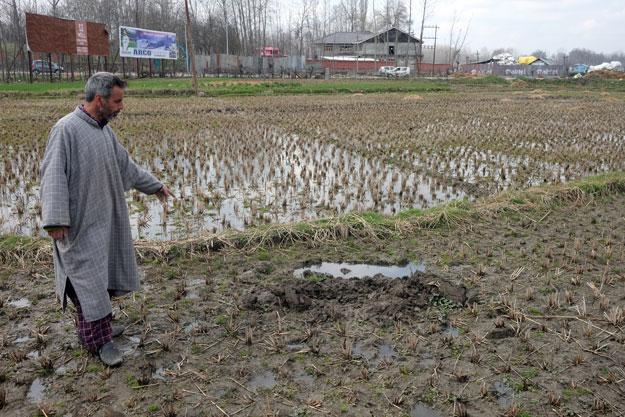
Shafqat Ahmad Bhat points to where he says he was forced to bury an unexploded rocket used by the Indian army in Pinglan village in occupied Kashmir's Pulwama district March 21, 2019. PHOTO: REUTERS
The army is yet to provide any further information on how he died, Amin said.
“We asked for information but they did not give it to us,” she said. “They hid what happened.”
Residents interviewed in Pinglan were almost all openly hostile to India and its soldiers.
Amin’s account of Bhat being taken by the army to search a building was consistent with the testimony of three other people, all of whom told Reuters they were forced to perform similar tasks.
A teenager, who said he was 17 and gave his name as Jibran, said he was one of a dozen mainly young men, who were taken from their homes to an armoured personnel carrier where they were held and then sent out to search houses. His account was corroborated by his grandfather and aunt.
“They gave me a shield and they said you have to move forward to search the houses,” he said. “I felt in danger.”
Bhat’s brother, Shafqat Ahmad Bhat, said he was also held by the army and sent to search a house and film it on a mobile phone near the end of the encounter.
Shafqat, along with half a dozen other villagers, said they were beaten by troops using rifle butts, sticks and other weapons.
“They put a stone in my mouth to keep me quiet because I was screaming so much,” Shafqat said.
While many of the injuries sustained by those who said they had been attacked were minor, Bhat family neighbour Shahzada Akhtar said she was repeatedly struck on the face with a shoe by a soldier and needed medical treatment.
Her account was corroborated by Rayees Ul-Hamid, a medical officer at Pinglan’s health centre.
The encounter was over and the soldiers were starting to move out of the village, but at about 6pm troops had one last job for Shafqat Ahmad Bhat.
“They asked me to pick up an unexploded shell, dig a hole in the ground and bury it there,” he said.
He led Reuters to a nearby rice paddy and pointed to a waterlogged crater where he said he buried the unexploded mortar used in the army operation.
After visiting the site on March 21, a Reuters journalist told the authorities about the mortar. A day later, bomb disposal experts from the army and police got rid of the rocket in a controlled explosion, a local official and witnesses said.
“There was a huge explosion. The earth shook,” said Bilal Ahmed, an eyewitness.
A fragile peace has returned to the village. The first apricot blossom of the season is beginning to bloom, while mynah birds chirp overhead.
But the trauma from the encounter has lingered.
Wuli Mohammed Naik, the grandfather of Jibran, the boy made to search houses, was one of many who said he was afraid to go out after dark.
“A man who is bitten by a snake is afraid of rope,” he said.


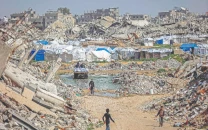

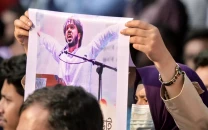
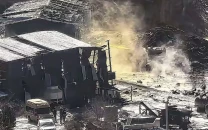
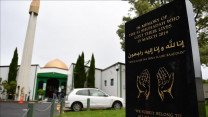












COMMENTS
Comments are moderated and generally will be posted if they are on-topic and not abusive.
For more information, please see our Comments FAQ